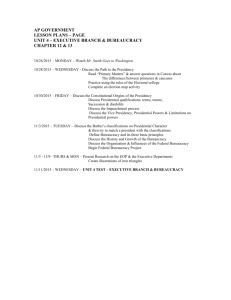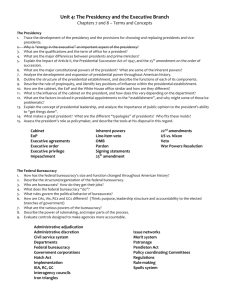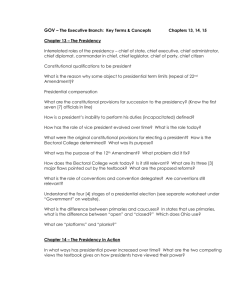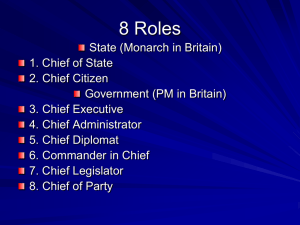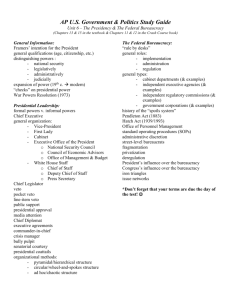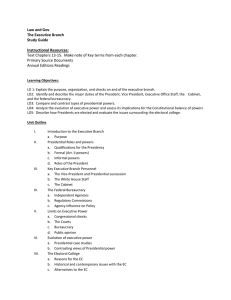Read the “What Would You Do?” on page 581 of your text.. Based
advertisement
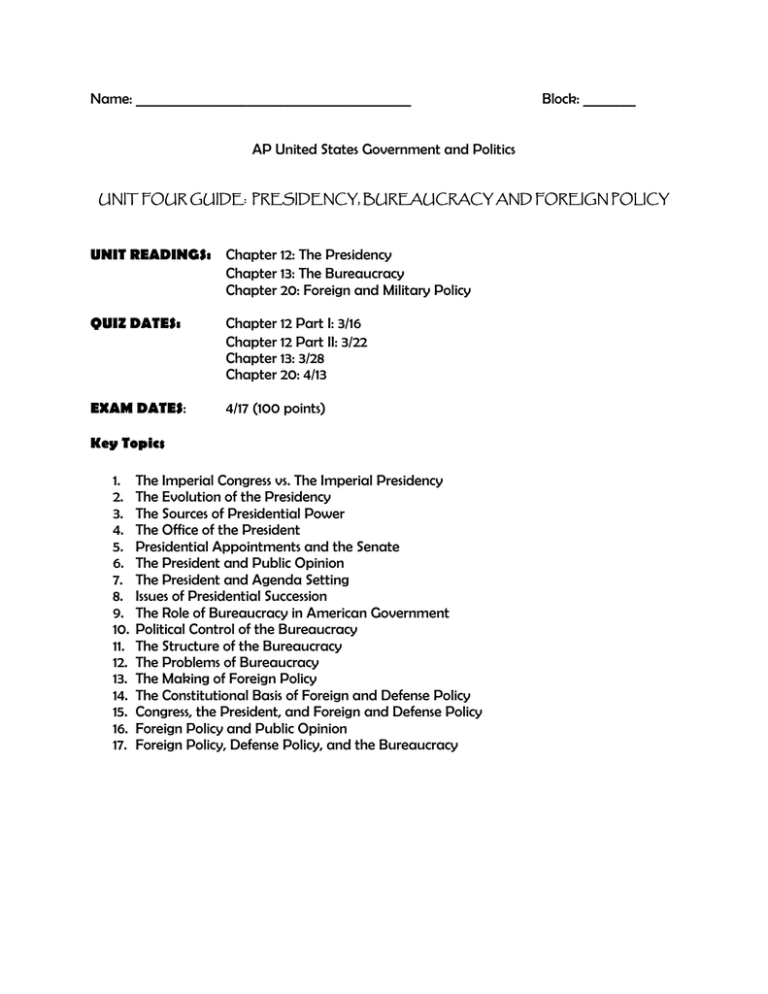
Name: __________________________________________ Block: ________ AP United States Government and Politics UNIT FOUR GUIDE: PRESIDENCY, BUREAUCRACY AND FOREIGN POLICY UNIT READINGS: Chapter 12: The Presidency Chapter 13: The Bureaucracy Chapter 20: Foreign and Military Policy QUIZ DATES: Chapter 12 Part I: 3/16 Chapter 12 Part II: 3/22 Chapter 13: 3/28 Chapter 20: 4/13 EXAM DATES: 4/17 (100 points) Key Topics 1. 2. 3. 4. 5. 6. 7. 8. 9. 10. 11. 12. 13. 14. 15. 16. 17. The Imperial Congress vs. The Imperial Presidency The Evolution of the Presidency The Sources of Presidential Power The Office of the President Presidential Appointments and the Senate The President and Public Opinion The President and Agenda Setting Issues of Presidential Succession The Role of Bureaucracy in American Government Political Control of the Bureaucracy The Structure of the Bureaucracy The Problems of Bureaucracy The Making of Foreign Policy The Constitutional Basis of Foreign and Defense Policy Congress, the President, and Foreign and Defense Policy Foreign Policy and Public Opinion Foreign Policy, Defense Policy, and the Bureaucracy Unit Assignments: 1. Due 3/30: ASSIGNMENT (15 points) Read the “What Would You Do?” on page 581 of your text.. Based on your understanding of the capabilities of the US military and the current international environment, write a 1-2 page reaction paper in which you explain which option you would pursue and why. 2. Due 4/19: UNIT ESSAY (20 points) Choose one of the topics below and write a 2-3 page essay following the standard format for this course. IMPORTANT NOTE FOR UNIT ESSAYS: If you do not feel that you have enough information to adequately write the essay that you choose, you should conduct some further research. All information needs to be cited within your paper. Internal citations are sufficient if the information has been provided by your instructor. However, if you use outside research, you should include a works cited page as well. a. Some have argued that Congress has attempted to reassert its power over the past thirty years at the expense of the presidency. In the view of these scholars, the so-called imperial presidency of Johnson and Nixon was eventually replaced by an imperial Congress in more recent decades. However, the 9/11 terrorist attacks seem to have set the stage for a return to the imperial presidency. Evaluate the validity of the imperial Congress thesis and assess the extent to which the changing political climate since September 11th has altered the balance of power between Congress and the president. b. "Presidential greatness, is to a large extent, determined as a result of a president being in the right place at the right time." Assess the validity of this statement. Be sure to define the criteria that you believe is necessary to characterize a president as great, to include historical examples to support your point, and to consider arguments for both sides of the question. b. Taking into account both the national security and economic concerns of the United States, defend one of the four worldviews (isolationism, containment, disengagement, or human rights) as being the most desirable course for US foreign policy in the 21st Century. Essays should reflect an understanding of the worldviews, recent history, and current events. Clear arguments and examples should be used to support your position. Essays should also reflect an awareness of concerns raised by the other worldviews. Chapter 12: The Presidency Part I (pp.333-353) KEY TERMS (Define them and explain importance in relation to chapter) Ad hoc structure Executive Office of the Office of Management and Appointment powers President Budget Article II Executive Departments Pardon Cabinet gridlock Perks Chief of Staff “in and outers” Prime minister Circular structure Imperial Congress Pyramid structure Commander-in-chief Imperial Presidency Treaty powers Divided government Independent agencies Twenty-second Amendment Electoral College Independent commissions Unified government Jacksonian Politics White House Office REBUTTALS (Refute each statement below. Use information that was provided from reading the chapter in your responses). 1. The official titles of Executive Office officials are an accurate reflection of their influence on the president. 2. The president has clear cut authority over executive agencies and only needs to be urged to exercise it. REVIEW QUESTIONS (Answer each question fully and completely by pulling information from the chapter). 1. Explain the difference between the positions of president and prime minister. 2. Discuss the approach of the Founders toward executive power. 3. Discuss the evolution of the presidency from 1789 to the present. 4. List and describe the various offices that make up the office of the president. 5. Discuss whether changes in the roles and responsibilities of the White House staff have led to greater presidential accountability and effectiveness. Support your argument with examples from two presidencies since 1961, making sure to define both presidential accountability and effectiveness. FREE REPSONSE QUESTIONS: (These questions are very similar to questions that appear on the AP Exam. Answer each question fully and thoroughly using complete sentences. It may require the use of outside information.) 1. The concept of “divided government” in the United States means that one political party can control the executive branch while another controls the legislative branch. This poses problems for the president in making appointments to federal offices. a. Describe two problems that divided government poses for the President in making federal appointments. b. Identify and explain two ways Presidents try to overcome the problems described in (a). Chapter 12: The Presidency Part II KEY TERMS (Define them and explain importance in relation to chapter) Budget Reform Act Legislative veto Bully pulpit Line-item veto Crisis leadership Mandate Executive privilege Midterm elections Honeymoon Moral authority Impeachment Pocket veto Impoundment of funds Presidential Character Lame duck Presidential Coattails Presidential Popularity Public Persuasion Succession Act Twenty-fifth Amendment United States v. Nixon Veto message REBUTTALS (Refute each statement below. Use information that was provided from reading the chapter in your responses). 1. Presidents are constitutionally required to share all their information with Congress. 2. Presidential powers under the Constitution are complete. CHECKING DATA (Use the information provided in charts, graphs, or maps in your text book to provide a thorough answer to the following questions. Using Table 12.3: 1. What hypothesis underlies the table? 2. What does the 1956 election suggest about the popularity of Eisenhower the individual and the popularity of the Republican party as an institution? 3. What other data would you like to have before concluding that there is or is not a presidential coattails effect? Using Table 12.4 and Figure 12.2: 1. What does Table 12.4 tell us? Keep in mind that Senate seats up for reelection are not evenly distributed between the two parties. 2. Compare the gains and losses in Table 12.4 with the level of presidential popularity in Figure 12. 4 form the same years. In how many midterm elections was there a decline in presidential popularity? 3. According to Figure 12.4, have presidents since 1964 been as consistently popular as those who served before 1964? REVIEW QUESTIONS (Answer each question fully and completely using information from the chapter). 1. Discuss presidential character and how these relate to the achievements in office of various presidents. 2. Discuss the various facets-formal and informal-of presidential power. 3. Discuss the factors that lead to conflict in executive-legislative relations. Can they be neatly placed in constitutionally and political categories? 4. If you were asked by the Founders to make recommendations on the presidency, what would you suggest, on the basis of 200 years of experience? FREE REPSONSE QUESTIONS: (These questions are very similar to questions that appear on the AP Exam. Answer each question fully and thoroughly using complete sentences. It may require the use of outside information.) 1. Presidential approval ratings fluctuate over the course of each presidential administration. a. Identify two factors that decrease presidential approval ratings, and explain why each factor has that effect. b. Identify two factors that tend to increase presidential approval ratings, and explain why each factor has that effect. Chapter 13: The Bureaucracy KEY TERMS (Define them and explain importance in relation to chapter) Agency culture Annual authorization Appropriations Authorization Buddy System Bureaucracy Committee clearance Competitive service Congressional investigations/oversight Discretionary authority Expected service expenditures Iron triangle Issue networks Legislative veto Merit System Name-request job National Performance Review Office of personnel management Patronage Pendelton Act Red tape Regulatory rule Schedule C Senior Executive Service Spoils system Trust funds REBUTTALS (Refute each statement below. Use information that was provided from reading the chapter in your responses). 1. It does not matter who is hired as a civil servant so long as he or she has the requisite education. 2. Most bureaucrats are appointed by the president in power. 3. The federal bureaucracy operates essentially like a very large corporation. 4. Once an agency has accomplished its original tasks, it begins to decline in size and influence. CHECKING DATA (Use the information provided in charts, graphs, or maps in your text book to provide a thorough answer to the following questions. Using Figure 13.2: 1. What correlation do you see between expenditures and employment? Between regulations and employment? 2. Can you think of any reason that expenditures shot up suddenly in 1964-1966 period? 3. Can you think of any events in the 1070-1973 period that might explain the sharp increase in regulations? 4. What effects did the Reagan years (1980 – 1988) have on expenditures, regulations, and employment? Using Table 13.2: 1. On the basis of the table, what obvious conclusion can be drawn regarding the employment of minorities in the federal bureaucracy? REVIEW QUESTIONS (Answer each question fully and completely by pulling information from the chapter). 1. Discuss the history of the growth of bureaucracy in this country and the different uses to which it has been put. 2. Discus the recruitment, retention, and personal characteristics of federal bureaucrats. 3. Evaluate the effectiveness of congressional measures to control the bureaucracy. 4. Discuss why it is so difficult to control the bureaucracy. 5. Discuss the four factors that help explain the behavior of appointed officials. Which do you think is the most important? 6. What are some examples of bureaucratic pathologies? Why do each of them exist? Can they be corrected? Why or why not? FREE REPSONSE QUESTIONS: (These questions are very similar to questions that appear on the AP Exam. Answer each question fully and thoroughly using complete sentences. It may require the use of outside information.) 1. Is Congress effective in exercising legislative oversight of the federal bureaucracy? Provide a clear answer to the question with supporting detail but in doing so, be sure to do both of the following: a. Explain two specific methods Congress uses to exercise effective oversight of the federal bureaucracy. b. Give two specific explanations for the failure of Congress to exercise effective oversight of the federal bureaucracy. Chapter 20: Foreign and Military Policy KEY TERMS (Define them and explain importance in relation to chapter) Appeasement Armed Services Committee Client foreign policy Cold war Containment Cost overruns Council on Foreign Relations Defense Reorganization Plan Disengagement view Domino Theory “gold plating” Human rights Interest group foreign policy Internationalism Interservice Rivalry Iron curtain Isolationism Joint Chiefs of Staff Majoritarian foreign policy Military-industrial complex NAFTA Multinational Corporation Multilateralism National Security Act NSC Peace dividend “sole sourcing” State Department Strategic Defense Initiative Third World Unilateralism War Powers Act REBUTTALS (Refute each statement below. Use information that was provided from reading the chapter in your responses). 1. Because the public always rallies around the flag in crises, the president has great freedom of action to whatever he wants in international affairs. 2. The Joint Chiefs of Staff command a unified defense establishment. 3. With the collapse of the Soviet Union and the end of the Cold War, military power has become less important. CHECKING DATA (Use the information provided in charts, graphs, or maps in your text book to provide a thorough answer to the following questions. Using Table 20.1: 1. What conclusion can be drawn regarding the effect of a foreign policy crisis on the president’s approval rating? Using Table 20.3: 1. On what two issues did Regan administration officials disagree most sharply with other foreign policy leaders? 2. On what issues were the opinions of Reagan administration officials most closely in accordance with the opinion of other foreign policy officials? Using Figure 20.1: 1. Which presidents noticeably increased or decreased military spending after taking office? REVIEW QUESTIONS (Answer each question fully and completely by pulling information from the chapter). 1. Compare the powers of U.S. presidents with those of heads of states in other Western governments with respect to the making of foreign policy. 2. Discuss the provisions of the War Powers Act and the effects that those provisions seem like to have on presidential war-making abilities. 3. Compare and contrast these worldwide views: isolation, containment, disengagement, and human rights. 4. Discuss the drawbacks and the advantages of interservice rivalries. 5. Discuss the bureaucratic factors that tend to create the cost-overrun problem, and describe a solution you think might work. 6. Using specific examples, discuss the relationship between public opinion and foreign and defense policy. In doing so, be sure to consider the effects that public opinion has on foreign and defense policy, the effects that foreign and defense policy have on public opinion, and cleavages within public opinion with regard to foreign and defense policy. FREE REPSONSE QUESTIONS: (These questions are very similar to questions that appear on the AP Exam. Answer each question fully and thoroughly using complete sentences. It may require the use of outside information.) 1. Presidents are generally thought to have advantages over Congress in conducting foreign policy because of the formal and informal powers of the presidency. a. Identify two formal constitutional powers of the President in making foreign policy. b. Identify two formal constitutional powers of the Congress in making foreign policy. c. Identify two informal powers of the President that contribute to the power of the President over Congress in conducting foreign policy. d. Explain how each of the informal powers identified in (C) contributes to the President’s advantage over Congress in conducting foreign policy.

